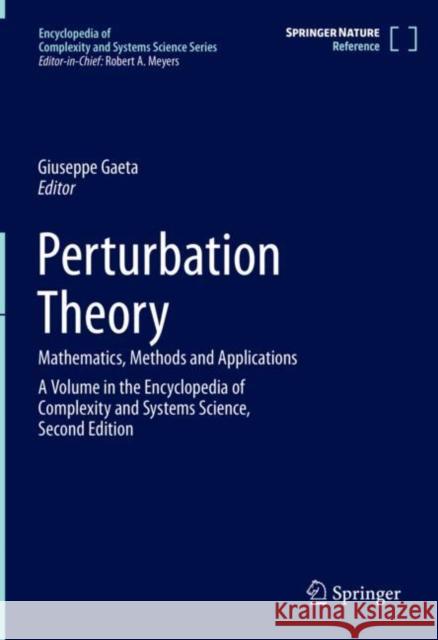Perturbation Theory: Mathematics, Methods and Applications » książka
Perturbation Theory: Mathematics, Methods and Applications
ISBN-13: 9781071626207 / Angielski / Twarda / 2022 / 596 str.
This volume in the Encyclopedia of Complexity and Systems Science, Second Edition, is devoted to the fundamentals of Perturbation Theory (PT) as well as key applications areas such as Classical and Quantum Mechanics, Celestial Mechanics, and Molecular Dynamics. Less traditional fields of application, such as Biological Evolution, are also discussed. Leading scientists in each area of the field provide a comprehensive picture of the landscape and the state of the art, with the specific goal of combining mathematical rigor, explicit computational methods, and relevance to concrete applications. New to this edition are chapters on Water Waves, Rogue Waves, Multiple Scales methods, legged locomotion, Condensed Matter among others, while all other contributions have been revised and updated. Coverage includes the theory of (Poincare’-Birkhoff) Normal Forms, aspects of PT in specific mathematical settings (Hamiltonian, KAM theory, Nekhoroshev theory, and symmetric systems), technical problems arising in PT with solutions, convergence of series expansions, diagrammatic methods, parametric resonance, systems with nilpotent real part, PT for non-smooth systems, and on PT for PDEs [write out this acronympartial differential equations]. Another group of papers is focused specifically on applications to Celestial Mechanics, Quantum Mechanics and the related semiclassical PT, Quantum Bifurcations, Molecular Dynamics, the so-called choreographies in the N-body problem, as well as Evolutionary Theory. Overall, this unique volume serves to demonstrate the wide utility of PT, while creating a foundation for innovations from a new generation of graduate students and professionals in Physics, Mathematics, Mechanics, Engineering and the Biological Sciences.
This volume in the Encyclopedia of Complexity and Systems Science, Second Edition, is devoted to the fundamentals of Perturbation Theory (PT) as well as key applications areas such as Classical and Quantum Mechanics, Celestial Mechanics, and Molecular Dynamics. Less traditional fields of application, such as Biological Evolution, are also discussed. Leading scientists in each area of the field provide a comprehensive picture of the landscape and the state of the art, with the specific goal of combining mathematical rigor, explicit computational methods, and relevance to concrete applications. New to this edition are chapters on Water Waves, Rogue Waves, Multiple Scales methods, legged locomotion, Condensed Matter among others, while all other contributions have been revised and updated. Coverage includes the theory of (Poincare’-Birkhoff) Normal Forms, aspects of PT in specific mathematical settings (Hamiltonian, KAM theory, Nekhoroshev theory, and symmetric systems), technical problems arising in PT with solutions, convergence of series expansions, diagrammatic methods, parametric resonance, systems with nilpotent real part, PT for non-smooth systems, and on PT for PDEs [write out this acronym partial differential equations]. Another group of papers is focused specifically on applications to Celestial Mechanics, Quantum Mechanics and the related semiclassical PT, Quantum Bifurcations, Molecular Dynamics, the so-called choreographies in the N-body problem, as well as Evolutionary Theory. Overall, this unique volume serves to demonstrate the wide utility of PT, while creating a foundation for innovations from a new generation of graduate students and professionals in Physics, Mathematics, Mechanics, Engineering and the Biological Sciences.











